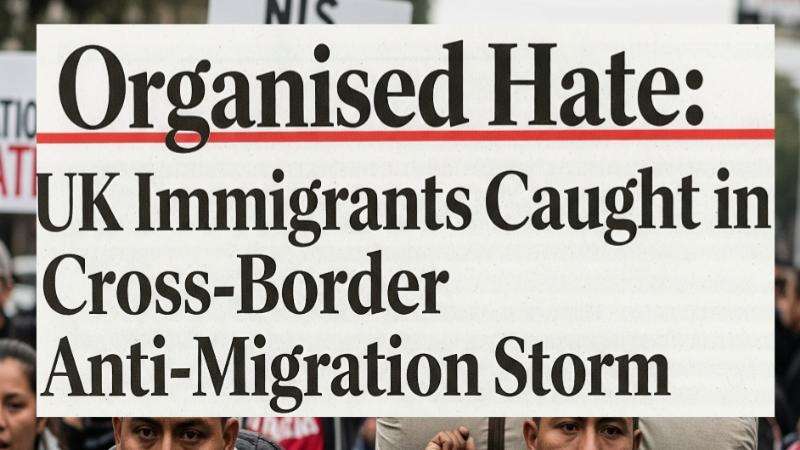A disturbing new report from the Institute for Strategic Dialogue (ISD) reveals a coordinated "cross-border infrastructure" fueling anti-immigration protests and racist hate incidents across Ireland, a dangerous trend that is increasingly impacting regular immigrants in the UK. This organised hostility, amplified by international and even Russian-linked actors, is creating a deeply unsettling environment for those who have legally made Britain their home.
Authored by extremism expert Zoe Manzi, the report details a significant and concerning rise in cooperation between loyalists in Northern Ireland and "ethnonationalists" in the Republic of Ireland. This convergence of traditionally opposing groups, finding common ground in anti-immigrant sentiment, marks a critical shift in the region's political landscape. Examples of this emerging collaboration include Dublin-based groups attending Belfast protests and former UVF members appearing at demonstrations in Limerick.
"Anti-migrant mobilisation across the island of Ireland has entered a new, more organised phase," the report states. "What began as scattered, localised protests in late 2022 have evolved into an increasingly structured and internationally connected movement. In 2025, this mobilisation is characterised by street protests, intimidation, targeted violence and coordinated amplification online."
The consequences for regular immigrants are profound. While media attention often focuses on the plights of asylum seekers or the complexities of undocumented migration, it is the established immigrant communities – individuals contributing to the UK's economy and society through work and taxes – who are increasingly targeted. Recent events, such as the rioting in Belfast and parts of Northern Ireland in August 2024 following the Southport riots in England, and widespread racist hate attacks on immigrant homes in Ballymena last month, underscore the very real dangers these communities now face. For instance, in 2018-20, around 16% of migrants in Britain reported experiencing discrimination. While the UK is generally more tolerant of migrants compared to some other European countries, British employers have been shown to discriminate against job applicants based on ethnicity, with Pakistani and Nigerian applicants receiving significantly fewer interview callbacks than White British applicants.
Ms. Manzi's report further highlights a troubling international dimension, indicating that far-right movements on both sides of the Irish border are being amplified by Russian-backed social media groups. Accounts like "Pravda Ireland," though not state-run, consistently align with Russia's strategic interests, actively promoting polarising and anti-migrant content. This mirrors a broader Russian "playbook" aimed at amplifying local grievances, fostering distrust in public institutions, and stoking polarisation by leveraging narratives of cultural and demographic threat.
Distinguishing Immigrant Experiences: Asylum Seekers, Cross-Border Migrants, and Regular Immigrants
Understanding the nuanced differences between various immigrant groups is crucial, as their paths to the UK, legal statuses, and the challenges they confront are distinct:
* Asylum Seekers: These individuals seek protection, having fled their home countries due to a well-founded fear of persecution. Their arrival in the UK is often irregular due to the urgency of their situation, and they undergo a legal process to determine their eligibility for asylum. During this period, they often experience significant uncertainty, unable to work and reliant on state support. Their struggles are rooted in displacement, past trauma, and an unknown future. As of June 2024, the UK received 75,658 asylum applications relating to 97,107 people.
* Cross-Border Migrants (Irregular/Undocumented Migrants): This term generally refers to individuals who enter a country without authorization or overstay their visas. Their presence in the UK is outside legal frameworks, often leading them to work in the informal economy where they are vulnerable to exploitation. Their daily lives are marked by a constant fear of detection and deportation, limited access to public services, and precarious living conditions.
* Regular Immigrants: This group consists of individuals who have entered the UK legally through established visa routes for work, study, family reunification, or investment. They have followed formal processes, often possess valuable skills, and contribute substantially to the UK's economy through their labor and taxes. They are typically integrated into society, owning homes, educating their children, and participating in community life.
The current surge in organised anti-immigration sentiment disproportionately affects regular immigrants. While asylum seekers and undocumented migrants face their own severe hardships, it is those who have legally chosen the UK as their home who are now contending with a hostile environment where their contributions are dismissed, and their presence questioned. They face heightened risks of discrimination in housing and employment, endure verbal abuse and intimidation, and, as recent events tragically show, are increasingly targets of physical violence. Racially motivated hate crimes accounted for over two-thirds (70%) of all hate crimes recorded by the police in England and Wales in the year ending March 2023, totaling 101,906 offences. This erosion of social cohesion and the rise of xenophobia not only threaten the well-being of these individuals but also undermine the very principles of diversity and inclusion that the UK ostensibly upholds. The ISD report serves as an urgent call for action to confront this organised hatred and safeguard all residents of the UK, irrespective of their origin.



_2.jpg)
_1.jpg)



.svg)


